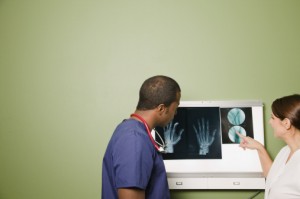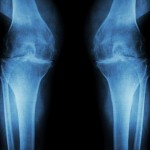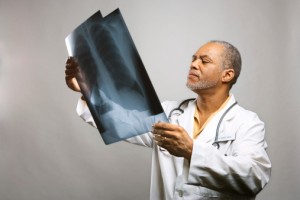Lupus (SLE) raises osteoporosis bone fracture risk
 Lupus – systemic lupus erythematosus – increases the risk of osteoporosis and bone loss. Lupus is an autoimmune disease that is more common among women. Osteoporosis has commonly been seen in lupus patients with risk factors including prolonged use of glucocorticoids, cyclophosphamide and possibly gonadotropin-releasing-hormone agonists. Specifically in premenopausal women with lupus, inflammation and medications to treat lupus can contribute to bone loss, which increases the risk of bone fractures.
Lupus – systemic lupus erythematosus – increases the risk of osteoporosis and bone loss. Lupus is an autoimmune disease that is more common among women. Osteoporosis has commonly been seen in lupus patients with risk factors including prolonged use of glucocorticoids, cyclophosphamide and possibly gonadotropin-releasing-hormone agonists. Specifically in premenopausal women with lupus, inflammation and medications to treat lupus can contribute to bone loss, which increases the risk of bone fractures.
Research has found that bone loss prevention in lupus patients should examine many areas, including calcium and vitamin D intake, age-appropriate supplementation and homocysteine. Patients experiencing bone loss should be monitored with bone mineral density scans to determine effectiveness of treatment.
How does lupus affect the bones?
 Osteoporosis is a condition that, like lupus, mainly affects aging women. Risk factors for osteoporosis include family history, menopause, certain medications, lack of calcium, lack of physical activity, smoking, and alcohol consumption.
Osteoporosis is a condition that, like lupus, mainly affects aging women. Risk factors for osteoporosis include family history, menopause, certain medications, lack of calcium, lack of physical activity, smoking, and alcohol consumption.
Many previous studies have found a link between lupus and osteoporosis. In fact, women with lupus have a five times greater risk of experiencing bone loss. There are many characteristics of lupus that contribute to osteoporosis. For starters, fatigue and low energy are symptoms of lupus that can deter a woman from partaking in exercise, which we know to be a risk factor for osteoporosis. Furthermore, medications commonly prescribed for lupus can also trigger bone loss. Lastly, some research has shown that bone loss is a direct complication of lupus disease itself.
Treatment of osteoporosis in people with lupus
When managing and treating osteoporosis, especially with lupus, many lifestyle factors come into play as they contribute quite a bit to the strength or weakness of bones. Therefore, in order to properly manage osteoporosis, changes to lifestyle can be effective in maintaining bone strength and density. Here are some tips to help better manage osteoporosis.
- Diet – Ensure you receive adequate amounts of vitamin D and calcium, but speak to your doctor prior to supplementing either to avoid complications. Food can be a great natural source of both vitamin D and calcium, so before you reach for any capsules, concentrate on improving your diet to incorporate more dairy and even dark leafy greens, which also contain calcium. Furthermore, the most natural way to obtain vitamin D is through sunlight, so as long as you’re practicing safe sun habits, you can easily obtain vitamin D.
 Exercise – When we exercise bone is broken down and rebuilt to make it stronger. Strength-training exercises, such as lifting weights, and aerobic exercises, such as running, can help strengthen bones.
Exercise – When we exercise bone is broken down and rebuilt to make it stronger. Strength-training exercises, such as lifting weights, and aerobic exercises, such as running, can help strengthen bones.
- Don’t smoke – Numerous studies have linked smoking with weaker bones.
- Minimize alcohol consumption – Similar to smoking, alcohol consumptions has been linked to weaker bones, so drinking in moderation is essential.
- Get a bone density test – You won’t know if you are experiencing bone loss unless you get yourself checked out. This way, your doctor can see your results and recommend a form of treatment.
- Medication – Based on your lupus and bone density results, your doctor may recommend some medication in order to treat both conditions. Common medications include: bisphosphonates; estrogen agonists/antagonists (also called selective estrogen receptor modulators or SERMS); calcitonin; parathyroid hormone; estrogen therapy; hormone therapy; and the recently approved RANK ligand (RANKL) inhibitor.
Prevention of osteoporosis in people with lupus
Lupus can increase common risk factors that are associated with osteoporosis, so the first step is to minimize such risk factors. These include exercising, even if you feel fatigued, getting enough calcium and vitamin D, and preventing falls. Furthermore, although you can’t change the fact that you are a woman, you can control risk factors while entering menopause. Speak to your doctor early on and become aware of your risks and how to reduce them.
Although osteoporosis and lupus do not have a cure, being education and conscious of what you do have control of can greatly reduce complications brought on by both diseases.
Osteoporosis bone loss raises risk of sudden hearing loss
Although osteoporosis mainly affects the bones, a new link has emerged between osteoporosis and hearing loss. According to the International Osteoporosis Foundation, one in three women over the age of 50 will develop osteoporosis – a disease categorized by bones becoming weak and brittle. While commonly referred to as a woman’s disease, men are not immune. Continue reading…
-
Is it Socializing or Emotional Eating?
If you’re an emotional eater, you may experience this common
-
When Gaining Love Means Gaining Weight
Do you tend to find your weight increases when you enter into a relat
-
Are You Really What You Eat? Probably Not!
Weve all heard the saying you are what you eat. Sure, it sounds great
-
10 Reasons Your Belly Pudge Won’t Budge
A little bit of fat in y
-
Whole Foods vs. Antioxidant Supplements for Optimal Health
Hundreds of studies done over the last few decades have shown the b
-
Strategies To Support Weight Loss
It is easy to become discouraged when on a weight loss program because
- DON'T MISS
- 3 Unique Techniques to Help You Manage Weight Loss
- Healthy Diet Plan Is The Key To Fast Fat And Weight Loss
- Gynexin - Getting Rid Of Man Boobs
- How to Prepare for Weight Loss Surgery
- A Short Cut To Weight Loss!
- White Bean Extract: Is it for Real?
- What Is Yacon Syrup?
- How To Lose Weight - Handy Basic Tips To Get Started
- Fad Weight Loss Food Regimen
- Where to Find a Free Glycemic Index Chart




